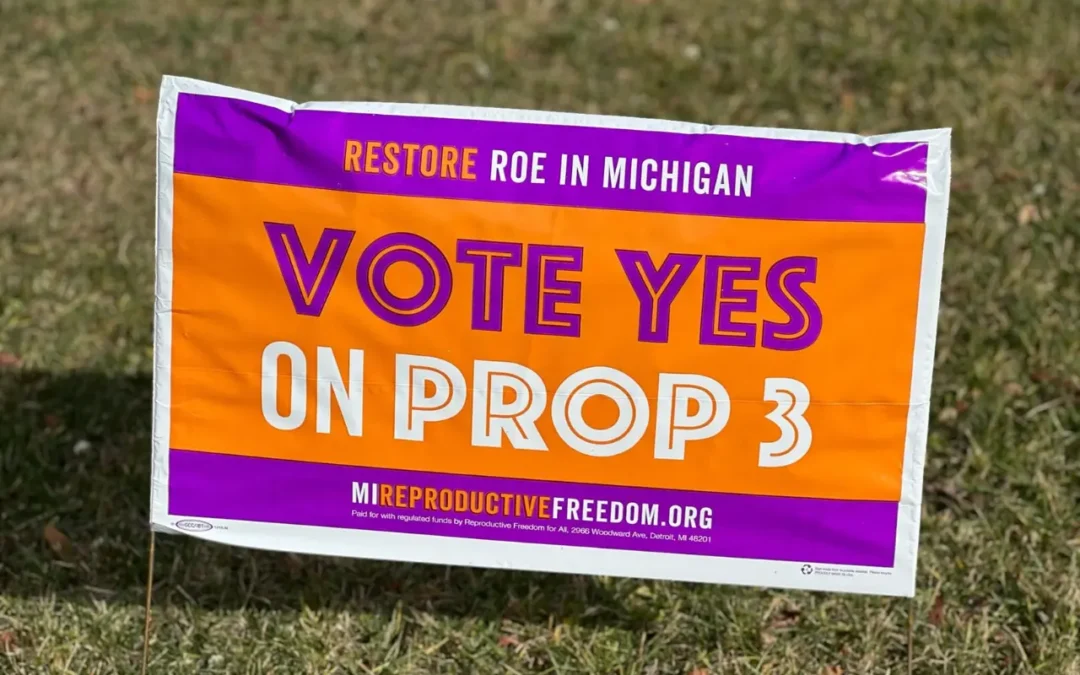
The Michigan Family Protection Act will create new legal protections for parents who choose to use fertility treatments, surrogacy, or any other form of assisted reproduction—including in-vitro fertilization treatment.
MICHIGAN—A package of bills signed into law this week by Gov. Gretchen Whitmer is designed to make it easier for Michiganders to start a family by protecting access to fertility care (including in-vitro fertilization treatment) and repealing state-level restrictions on paid surrogacy contracts.
The bills, known as the Michigan Family Protection Act, were approved by the state House last year, the state Senate last month, and signed into law by Whitmer on Monday. After signing the bills, Whitmer said the changes represent “commonsense, long-overdue action” to protect surrogates, parents, and children—and help ensure that LGBTQ parents are treated equally.
“Decisions about if, when, and how to have a child should be left to a family, their doctor, and those they love and trust, not politicians,” Whitmer said in a statement. “If we want more people and families to make it in Michigan, we need to support them with the resources they need to make these deeply personal, life-changing choices.”
Beyond making it easier for Michiganders to start a family, state lawmakers said the new laws will help save parents and surrogates time and money on government paperwork, as well as ensure Michiganders maintain access to fertility care amid ongoing attacks from conservatives.
Here’s the deal:
The Michigan Family Protection Act is composed of nine bills—House Bills 5207 through 5215. Together, they aim to support Michigan parents, children born through surrogacy or in-vitro fertilization (IVF), and LGBTQ parents who deserve to be treated equally under state law.
Specifically, the new laws will:
- Repeal a state law that had made Michigan the only state in the nation to criminalize paid surrogacy contracts, where a woman agrees to be impregnated through artificial insemination (or another woman’s fertilized egg) in exchange for money.
- Regulate surrogacy—namely by requiring that surrogates must have previously given birth and be 21 or older, have a medical and mental health consultation, and have access to independent legal counsel that’s paid for by the intended parents.
- Establish clear legal rights for parents, surrogates, and children who are born using surrogacy and other forms of assisted reproductive technology—including IVF.
- Ensure children born through surrogacy and assisted reproductive technology (including IVF) are treated equally under the law—including when it comes to dealing with inheritances and access to birth certificates and other government records.
- Change an outdated state law that requires LGBTQ families to go through a costly and invasive process in order to legitimize their legal rights as parents, ultimately ensuring that LGBTQ parents cannot be denied their relationship to their child.
- Make it easier (and cheaper) for all families to get formal recognition of their parental rights by eliminating bureaucratic red tape and previously required paperwork.
How did we get here?
Republican-led efforts to restrict abortion across the country resulted in a controversial ruling at the Alabama Supreme Court this year that found frozen embryos in test tubes are legally considered people, and that those who destroy them can be held liable for wrongful death.
By design, IVF produces multiple embryos in each round to increase the chances that one of them will eventually become viable. Sometimes one does. Sometimes none become viable. Since multiple embryos are produced in the process, the extras are either either frozen for future use, donated, or, if the couple doesn’t want to have any more children, destroyed.
In response to the ruling, several clinics in Alabama stopped providing IVF services out of fear they could face prosecution for lost or discarded embryos. The state’s government has since passed a law protecting IVF patients and providers from criminal liability, though they did not address the underlying issue of whether embryos were considered people.
The decision has since left many families across the country—including in Michigan—fearing that fertility treatments could be the next target of the anti-abortion movement.
What about Proposal 3?
In Michigan, the right to reproductive freedom—and the “right to make and effectuate decisions about all matters related to pregnancy”—is enshrined in the state Constitution after voters overwhelmingly passed Proposal 3 in 2022. That includes access to IVF treatment.
Since then, however, the right-wing attacks on reproductive freedom have only continued.
There have been bills introduced in over a dozen states—and at the federal level—that would effectively have the same IVF-banning consequences as the Alabama ruling.
This year, Right to Life Michigan filed a lawsuit challenging Proposal 3, threatening access to IVF, prenatal care, and other forms of reproductive health care. Another pending case in the US Supreme Court could restrict access to medication abortion nationwide—including in Michigan, where five Republican lawmakers signed a brief urging the court to restrict access to the drug.
Reports also show that ex-President Donald Trump has detailed plans to pursue a nationwide abortion ban if elected to another term.
Meanwhile, Whitmer and Democrats in the state Legislature are taking proactive steps to protect abortion and IVF access, and ensure equal rights for Michigan parents amid the right-wing attacks.
Whitmer said the Family Protection Act will empower Michiganders to “start and grow their families with ease and equality” by supporting parents and children born through surrogacy or IVF. She also called the new laws the “most pro-family thing” the Legislature has done.
“We are taking tangible action to show the rest of the nation that Michigan is a place where anyone can pursue their dreams of parenthood without unnecessary hurdles,” Senate Majority Leader Winnie Brinks (D-Grand Rapids) said in a statement. “After years of fighting hard to grant Michiganders the freedom to grow their families through surrogacy, it’s an incredible relief and honor to be here as this long-awaited legislation is finally signed into law.”
READ MORE: Michiganders protected abortion. Republicans are plotting a reversal.
For the latest Michigan news, follow The ‘Gander on Twitter.
Follow Political Correspondent Kyle Kaminski here.
Support Our Cause
Thank you for taking the time to read our work. Before you go, we hope you'll consider supporting our values-driven journalism, which has always strived to make clear what's really at stake for Michiganders and our future.
Since day one, our goal here at The 'Gander has always been to empower people across the state with fact-based news and information. We believe that when people are armed with knowledge about what's happening in their local, state, and federal governments—including who is working on their behalf and who is actively trying to block efforts aimed at improving the daily lives of Michigan families—they will be inspired to become civically engaged.


Wakefield doula helping local moms as federal funding cuts impact the Upper Peninsula
As federal funding cuts cause more rural hospitals in the Upper Peninsula to close their doors, doulas like Lynnea Laessig of Wakefield are stepping...

Right to Life of Michigan files court appeal to challenge Proposal 3 claiming ‘dangerous overreach’
BY KATHERINE DAILEY, MICHIGAN ADVANCE MICHIGAN—Right to Life of Michigan, alongside several parents, have filed an appeal in the US Court of Appeals...

These two southeast Michigan moms want to fight for their communities—so they’re running for office
As Republican lawmakers try to cut maternal health care resources in Michigan and beyond, these ‘Ganders are pushing back—by trying to replace...

This Detroit community is helping its neighbors recover with abortion after care event
“At the end of the day, it’s going to be a community that pours into one another, especially when things get hard.” As attacks on abortion and...

Planned Parenthood extends telehealth to 7 days a week in Michigan due to growing demand
“For many of our patients, telehealth is literally lifesaving.” In response to the escalating attacks on sexual and reproductive health care...





